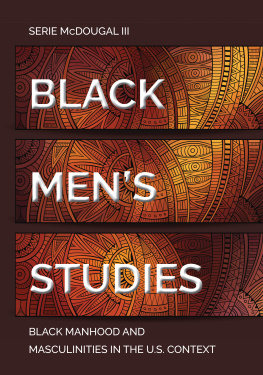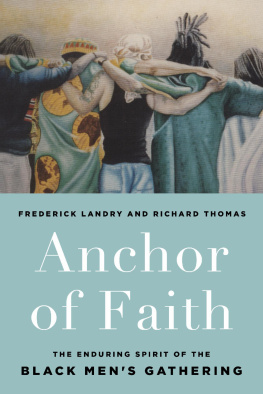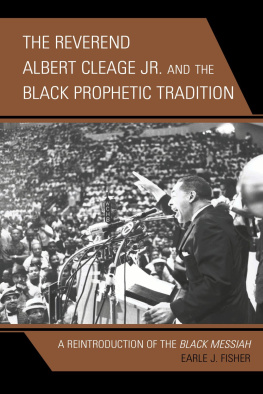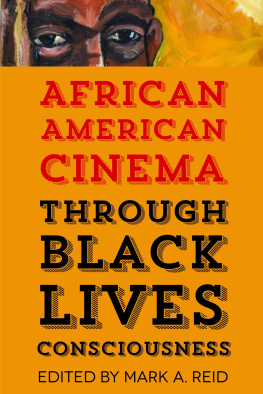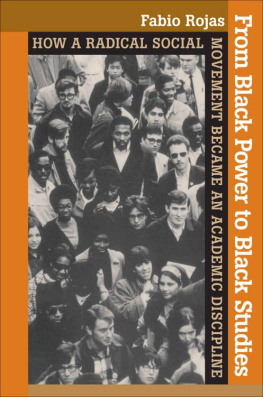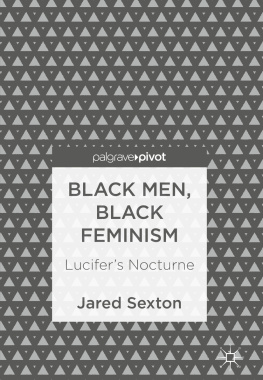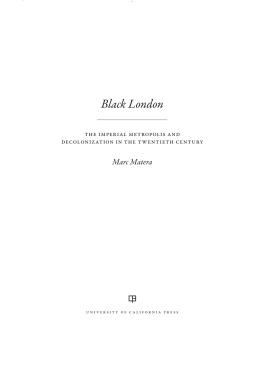Vol. 115
Serie McDougal III
Black Mens Studies
Black Manhood and Masculinities in the U.S. Context

PETER LANG
New York Bern Berlin
Brussels Vienna Oxford Warsaw
Library of Congress Control Number: 2020936820
Bibliographic information published by Die Deutsche Nationalbibliothek .
Die Deutsche Nationalbibliothek lists this publication in the Deutsche
Nationalbibliografie; detailed bibliographic data are available
on the Internet at http://dnb.d-nb.de/.
ISSN 1947-5985
ISBN 978-1-4331-7675-3 (paperback: alk. paper)
ISBN 978-1-4331-7676-0 (ebook pdf)
ISBN 978-1-4331-7677-7 (epub)
ISBN 978-1-4331-7678-4 (mobi)
DOI 10.3726/b16453
2020 Peter Lang Publishing, Inc., New York
29 Broadway, 18th floor, New York, NY 10006
www.peterlang.com
All rights reserved.
Reprint or reproduction, even partially, in all forms such as microfilm,
xerography, microfiche, microcard, and offset strictly prohibited.
About the author
Serie McDougal, III is a professor in the Department of Pan African Studies at California State University, Los Angeles. He received his B.S. in sociology from Loras College in Dubuque, Iowa. Additionally, he has an M.A. in Africana studies from the State University of New York at Albany, New York, and a Ph.D. in African American studies from Temple University in Philadelphia, Pennsylvania. Serie McDougal is also the co-director of the Afrometrics Research Institute.
About the book
Black Mens Studies offers an approach to understanding the lives and the self determination of men of African descent in the U.S. context. It not only frames their experiences, it also explores the multidimensional approaches to advancing the lives of Black men. Particular attention is given to placing Black men in their own unique historical, cultural, and socio-political contexts.
This eBook can be cited
This edition of the eBook can be cited. To enable this we have marked the start and end of a page. In cases where a word straddles a page break, the marker is placed inside the word at exactly the same position as in the physical book. This means that occasionally a word might be bifurcated by this marker.
Contents
T he initial idea for this research grew out of my attendance at several conference presentations dealing with topics on or related to Black men and/or boys. Although intriguing, so many of them painted remarkably similar pictures of Black males. So much appeared to be missing; historical context, social and cultural context, variation, diversity, and the voices of Black males themselves. This experience sent me searching through library databases for books and articles related to Black males. The available body of literature on Black males was like an exciting and provocative box of puzzle pieces. But alas, it was as if half the pieces were missing. Part of my existence I owe to my father, yet there are few reflections of men like my father in the vast body of literature on Black males. He was not alonethe fullness of most Black males lives is seldom reflected in most literature about Black males. What emerged was an awareness of the need for a systematic approach to studying the lives of Black men and boys.
The process of developing the systemic approach laid out in this text was aided by many conversations with my family, friends, colleagues, and students. First and foremost, I must thank my father Serie McDougal Jr. and my grandfathers, Serie McDougal Sr. and Will Ellis. This book is dedicated to these men. I would like to thank my editor, Sean Dennis. I owe a great deal of gratitude to my Black male mentors Molefi Asante, James Earl Davis, Daniel Johnson, Marc McConney, Wade Nobles, and Oba TShaka and others who have at critical times in my life seen potentialities in me that I was unable to see in myself. I also owe a great deal of thanks for the support of my brothers who repeatedly had critical conversations with me about this project, including John Adams, Eric Durnell, Paul Easterling, Justin Gammage, Clarence George, LeShaunte LeFlore, Orron Marshall, and Michael Tillotson. This work benefited greatly from critical dialog with Tanisha Burke, Ifetayo Flannery, Crystal Guillory, Sureshi Jayawardene, Natalie Lewis, Patricia Nunley, Dorothy Tsuruta and my mother and sister Anne and Shannon McDougal. Lastly, throughout this process I have benefited from the love and support of my dear Precious Zamaswazi Dlamini.
xi | xii xii | xiii
I n Malidoma Soms book, Of Water in the Spirit , the second chapter is titled Trying to See. The author details his experience being led by elder men through a Dagara initiation process for young males. The Dagara are an ethnic group found in Ghana, Burkina Faso, and Cote dIvoire. One part of this initiation process is dedicated to the development of sight . Without sight, Som and the other initiates could not go through the other trials and lessons in their route to manhood. On page 203, an elder addresses the young males:
Tomorrow we will begin working with your sight, the coach continued. You must learn to see. Without good sight, you cant continue with the other sessions. When you have learned to see well, you will journey one by one to your respective places in this world and find every piece of your self. For now, I want you to sleep. Put your weary bodies to rest for the night and put your spirits in a state of awareness. There will be no further pause in this instruction until it is all over. (Som, , p. 203)
The elders leading the initiation explained it is not possible to have knowledge without sight. For the Dagara, seeing goes beyond visual acuity, which is the narrowest level of perception (Som, ) words, We perceive the world based on our expectations, which are heavily determined by our context (p. 65). The historical and contemporary social context in which Black males live, interacting with themselves and others, includes certain expectations. How do expectations of Black males shape the way people perceive and interact with them? How do they shape how people casually think about Black males? How do these expectations shape the way professional researchers study and write about Black males?

